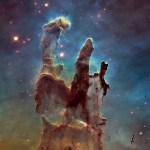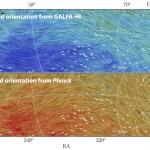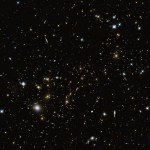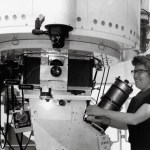Astronomy
“Men go abroad to wonder at the heights of mountains, at the huge waves of the sea, at the long courses of the rivers, at the vast compass of the ocean, at the circular motions of the stars, and they pass by themselves without wondering.” -Saint Augustine
Well, another week has gone by -- the second of the year -- here at Starts With A Bang! Hopefully, none of you noticed a drop in the quality or frequency of the science I've been bringing you, because I've had the flu, but I've been working hard to make sure you get all the science you've come to expect. And it's been a tremendous…
“The history of astronomy is a history of receding horizons.” -Edwin Hubble
Over its more than 25 year lifetime, the Hubble Space Telescope has shown us what the Universe truly looks like. It’s done so in a myriad of ways, from planets to stars – dying and forming – to galaxies to gravity’s effects to the deepest abysses of blackness of all. Nothing in space is the same as it was before humanity knew Hubble. Yet even the camera most responsible for our iconic images, WFPC2, isn’t the end of the story.
The gravitationally interacting system, Arp 147. Image credit: Arp 147, via NASA, ESA, and…
"In the far, far future, essentially all matter will have returned to energy. But because of the enormous expansion of space, this energy will be spread so thinly that it will hardly ever convert back to even the lightest particles of matter. Instead, a faint mist of light will fall for eternity through an ever colder and quieter cosmos." -Brian Greene
It seems like the simplest, most fundamental quantitative question about the expanding Universe of all: how fast is it expanding? Even though it's been more than 80 years since Hubble's most career-defining discovery, we still don't know the…
"...because that goal will serve to organize and measure the best of our energies and skills; because that challenge is one that we are willing to accept, one we are unwilling to postpone." -John F. Kennedy
The Hubble Space Telescope, for all of its scientific findings and how it revolutionized our understanding of the Universe itself, touched us all in a way that no piece of knowledge could ever encapsulate. In perhaps the greatest find of all, Hubble answered a question that many of us have had on our minds every time we've gazed up at a night sky: what does the Universe actually look…
"The discovery that young galaxies are so unexpectedly bright--if you look for this distinctive green light--will dramatically change and improve the way that we study Galaxy formation throughout the history of the Universe." -Matthew Malkan
Galaxies come in many different colors today: white, blue or red, mostly, depending on the populations of stars inside. But in a very rare set of circumstances, there can be green emissions as well, due mostly to the emission lines of doubly-ionized oxygen. The problem is we only see these in extraordinarily hot regions of the Universe, where ultra-hot…
"Life would be tragic if it weren't funny." -Stephen Hawking
Well, the first week of the year is behind us here at Starts With A Bang! For most people, that means struggling to return from a long holiday break, but in the world of astronomy that means we've just come back from an incredible week of science at the annual American Astronomical Society meeting! We've had an abnormally large number of stories as a result, and you'll be treated to a stream of in-depth, cutting edge stories smattered throughout the rest of the month! Here's what we've covered so far:
Why doesn't Earth's…
"Other galaxies like Andromeda are shooting these ‘spitballs’ at us all the time." -James Guillochon, coauthor on the new study
Imagine you're a star passing too close to a black hole. What's going to happen to you? Yes, you'll be tidally disrupted and eventually torn apart. Some of the matter will be swallowed, some will wind up in an accretion disk, and some will be accelerated and ejected entirely. But quite surprisingly, the ejected matter doesn't just come out in the form of hot gas, but it condenses into large numbers of rapidly-moving planets.
An artist's illustration of large, rapid…
"Far out in the uncharted backwaters of the unfashionable end of the western spiral arm of the Galaxy lies a small unregarded yellow sun. Orbiting this at a distance of roughly ninety-two million miles is an utterly insignificant little blue green planet whose ape-descended life forms are so amazingly primitive that they still think digital watches are a pretty neat idea." -Douglas Adams
If you want to know how many and what type of chemical elements are present in a star system, you need to make a dizzying, intricate array of observations. You need to break up the light from the star into…
"The mystery about α is actually a double mystery. The first mystery – the origin of its numerical value α ≈ 1/137 has been recognized and discussed for decades. The second mystery – the range of its domain – is generally unrecognized." -Malcolm H. MacGregor
We assume that the fundamental constants are truly constant, but they don't have to be. The speed of light is the same everywhere, but it could have been different elsewhere, either in space or in time. The same is true for other constants, like Planck's constant, the gravitational constant, or even the fundamental charges or masses of…
"Every philosophy also conceals a philosophy; every opinion is also a hideout, every word also a mask." -Friedrich Nietzsche
If you want to see all the way back to the Big Bang -- to the cosmic microwave background -- that means looking back through billions of light years worth of space. While individual point sources like stars and distant galaxies are relatively easy to exclude, the most catastrophic interfering factor is the Milky Way itself. Gas, dust, spinning molecules, magnetic fields, stars and more are all known to play a role.
The alignment of neutral hydrogen (white lines) with…
“You may hate gravity, but gravity doesn’t care.” –Clayton Christensen
If all we had were galactic rotation curves -- like those measured by Vera Rubin -- we would know that something was wrong with our picture of the Universe, but we wouldn’t know how. Two equally good explanations, that there was either a flaw in the law of gravity or there was the existence of some unseen mass, could account for what we saw. But observations of galaxy clusters point to dark matter in a dramatic fashion.
The Coma cluster of galaxies, whose galaxies move far too quickly to be accounted for by gravitation…
"Science progresses best when observations force us to alter our preconceptions." -Vera Rubin
When you look at a galaxy in the night sky, it’s easy to imagine that it’s just a system of masses like our Solar System, except on a larger scale. Instead of a single, central mass, you have many stars responsible for the galaxy’s gravitational pull. The stars revolving around the galactic center feel the tug from all the other stars and orbit accordingly, with the inner stars orbiting quickly and the outermost ones -- the ones most distant from the gravitational sources -- orbiting more slowly,…
"It's the first time the universe has spoken to us through gravitational waves, up to now we've been deaf to them." -Dave Reitze
No doubt about it: the greatest science advance of 2016 was the end of the century-long wait for the first direct detection of gravitational waves. Not only were we able to detect the inspiral and merger of two black holes from their emission of gravitational waves, we were able to do it more than once. The announcement was a 101-year-after-the-fact confirmation of one of Einstein’s greatest and most unique predictions.
The signal from LIGO of the first robust…
“Deep into that darkness peering, long I stood there, wondering, fearing, doubting, dreaming dreams no mortal ever dared to dream before.” -Edgar Allan Poe
No matter where you look in the night sky, a powerful enough telescope appears to reveal points of light. Even if you find a region with no stars in the Milky Way, you’re likely to find thousands of galaxies in the deep sky beyond, as the Hubble Deep Field and successor images demonstrated. However, it wasn’t until 2010 and the WFC3 that we were able to get deep, wide-field views simultaneously.
A ground-based view of the region of sky…
"I think that Walter Schirra aboard Mercury 8 was the first of the astronauts to use the code name 'Santa Claus' to indicate the presence of flying saucers next to space capsules." -Maurice Chatelain
Well, here we are: December 25th, Christmas day, here at Starts With A Bang! Whether you're a Santa, a Scrooge or anywhere in between when it comes to the generosity of your holiday spirit, I've got some good things for you. First, there's a brand new Starts With A Bang podcast for you to enjoy, on whether our Universe itself could be the inside of a black hole.
And second, as…
"Just to clarify, neither Jason or myself ... are advocating that it is an alien megastructure, but we also can't completely rule it out." -Kimberly Cartier
When we launched the Kepler spacecraft, we expected that we’d be able to measure the light from over 100,000 stars at once, practically continuously, over the timespan of many years. We discovered a number of planets, variable stars and eclipsing binaries, including many of the most Earth-like planets ever. But one star stands out as unique: Tabby’s star.
The flux, including the dips, in KIC 8462852, exhibiting unprecedented dimming and…
"A bit of mould is a pleiad of flowers; a nebula is an ant-hill of stars." -Victor Hugo
In the distant future, about 7 billion years from now, our Sun will run out of all the nuclear fuel it’s capable of burning in its core. As it contracts under its own gravity, radiation becomes unable to hold it up any longer. Gravitation takes over, and the outer layers get blown off as the core contracts down into a white dwarf.
A star reaching the end of its life goes from fusing nuclei to blowing off its outer layers and contracting down. Image credit: NASA, ESA, and A. Zijlstra (The University of…
"Bringing an asteroid back to Earth? What's that have to do with space exploration? If we were moving outward from there, and an asteroid is a good stopping point, then fine. But now it's turned into a whole planetary defense exercise at the cost of our outward exploration." -Buzz Aldrin
Between recent statements from NASA, the American Geophysical Union and Los Alamos National Laboratory, you might think that humanity is overdue for a catastrophic impact from outer space. Indeed, it’s been a long time since we’ve had one that was very destructive, and other than the 1908 Tunguska blast, we…
"Even with all the collected data we cannot say with 100% certainty that the ASASSN-15lh event was a tidal disruption event. But it is by far the most likely explanation." -Giorgos Leloudas
Last year, a record-shattering event occurred: we saw the brightest supernova ever observed in the Universe. It outshone the previous record holder by more than double, and it reached a peak brightness of more than 20 times the sum total of all the stars in the Milky Way galaxy. Surprisingly, it occurred in a red, quiet galaxy, rather than the bright blue ones famous for them. After 10 months of follow-up…
"When we recall the past, we usually find that it is the simplest things - not the great occasions - that in retrospect give off the greatest glow of happiness." -Bob Hope
When a very massive star reaches the end of its life, it runs out of burnable fuel. As a result, the core collapses, heats up and undergoes a runaway fusion reaction. While many heavy elements are formed and a tremendous amount of energy is released, the very core implodes, tearing apart the outer layers of the star in a supernova explosion.
An animation sequence of the 17th century supernova in the constellation of…


















